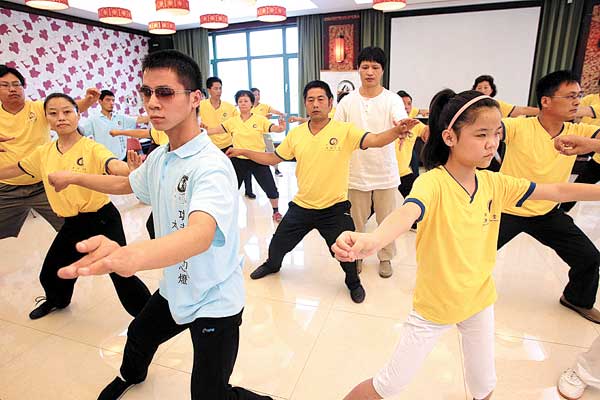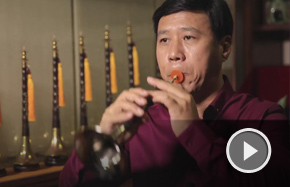Tai Chi by touch
 |
|
Photo by Zhang Wei / China Daily |
In the winter of 2010, Zheng's grandmother passed away. That was when Zheng decided to learn a skill to make a living. He learned about Zhangcheng School for the Blind in Hebei, where visually impaired people can learn massage skills for free. He immediately called the school for information and made the trip.
That was when he met Li, who also came to the school to learn massage skills. Shortly after the new semester started, Wan Zhouying was at the school and gave them a short introduction about tai chi and its origin, and told them that he would be at the school once a week to teach them tai chi.
The idea of teaching tai chi to visually impaired people was introduced to Wan by a friend who worked in the US embassy to China. "I had no idea how things would turn out at that time," he says. "I have never done this before, and this is like an experiment."
In fact, the first class Wan gave made him a little upset.
"Everything I have been teaching for years had to be changed," Wan says, noting that a common way to teach is to make comparisons and use metaphors so students will grasp the feeling.
"We might say, for example, to swing out your arm like a whip," he says. "But when it comes to blind people, this does not work at all. They have no idea what a whip is."
The first class took him more than two hours. Yet when he came to the school the following week, Wan was surprised that almost every student remembered what he taught in the first class - all of the movements.
"I was very surprised, and inspired," he says. "I then realized that these visually impaired students concentrate much more on their learning, because they have almost no extra curricular activities."
This is exactly the case for Zheng and Li.
"I want to perform better than my classmates and I want to be praised," Zheng laughs as he recalls. "I even get up and practice at midnight."
This August, 35 teachers from schools for the blind as well as rural primary schools all around China came to Beijing and joined Wan for 12 days of tai chi training. Li and Zheng worked as his teaching assistants.
Since the training program ended, Zheng and Li now live and study in the organization's offices in Beijing.
Li's fierce temper has relaxed greatly during the past two years since he learned tai chi.
"What will I do if one day the organization no longer needs me?" he says. "I may still need to rely on working as a masseur for living. But I will definitely keep practicing tai chi. This is something that makes me feel that life is beautiful and meaningful."
See more China Face, here

















